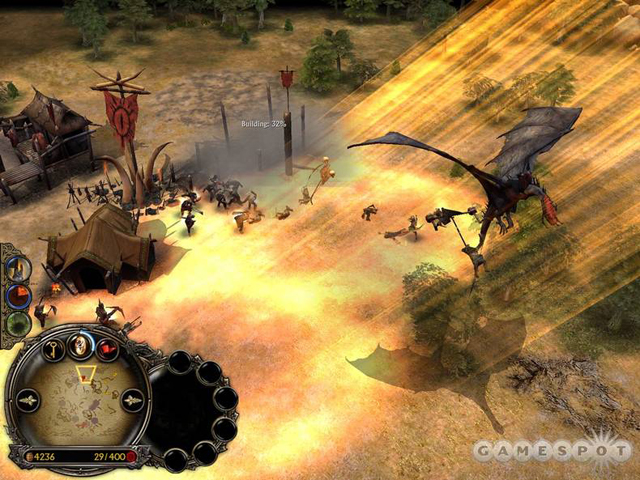Developing games: dream job or serfdom?

For many developers, the opportunity to work in the gaming industry seems like a fun-filled and glamorous proposition, but the reality doesn't always live up to the dream.
Working conditions in game studios has received increased scrutiny over the last decade, with the enduring example of the entire discussion arising in November 2004, when an anonymous blog post by the partner of an EA Games developer working on The Lord of the Rings, The Battle for Middle-earth detailed a studio-wide, 85-hour work week.
"The stress is taking its toll," the blogger wrote. "After a certain number of hours spent working, the eyes start to lose focus; after a certain number of weeks with only one day off, fatigue starts to accrue and accumulate exponentially. There is a reason why there are two days in a weekend — bad things happen to one's physical, emotional and mental health if these days are cut short. The team is rapidly beginning to introduce as many flaws as they are removing."
The blog post gained widespread media attention and, later, saw EA settle over US$30 million in overtime to staff at its California studio following three class-action lawsuits. The "EA Spouse" saga, led by blogger Erin Hoffman, shone a spotlight into the dark corners of game development. For the first time, it seemed, gamers were made aware that making video games for a living isn't necessarily as fun as it sounds.

The "EA Spouse" saga centred around the overtime working conditions on EA's The Lord of the Rings, The Battle for Middle-earth.
(Credit: EA)
A similar incident in early 2010, ahead of the release of Red Dead Redemption, saw the "Determined Devoted Wives of Rockstar San Diego employees" publish a scathing attack against that studio's management on industry website Gamasutra and threaten legal action if their partners' working conditions were not improved. It is unclear whether that situation was resolved, although it appears that no lawsuits were filed against Rockstar Games. More recently, Team Bondi, the Sydney-based developer of the Rockstar Games-published L.A. Noire, was revealed to have instigated what former employees referred to as an "ominous crunch" (the intensive period before a deadline) that lasted for years, and a revolving-door staff policy that saw over a hundred employees leaving throughout the game's seven-year development.
Those three games — Battle for Middle-earth, Red Dead Redemption and L.A. Noire — achieved Metacritic ratings of 82, 95 and 89, respectively. Collectively, they were enjoyed by an audience of millions across the PC, Xbox 360 and PlayStation 3 platforms. In the grand scheme of things, it's all too easy to sweep a few months — or, in the case of L.A. Noire, years — of long working hours under the rug and bask in the shining glory of the final products. But to do so would be a mistake, argued Kenneth Yeast, who was the engineering development director at Electronic Arts during the Battle for Middle-earth project.
The development team — which consisted of around 100 full-time staff, including management — worked "60-something days straight" until the game shipped in November 2004, said Yeast. Staff were required to be in the office by 9:30am and would go home typically around 9pm — sometimes, as late as 11pm.
"It was insane," he remembers. "[Management] refused to cut any feature, or adjust anything to change the scope of the delivery, in order to fit the deadline. It was rough. I was warned when I was hired that they were expecting to go into crunch. It has its effects. I know I'm getting older, but I felt my eyesight got worse, even during that period of time. It was stressful."
Yeast — who is currently the director of engineering at California-based mobile game developer Bad Juju Games — compared game development to a sausage factory.
"You may like to eat sausages," he said, "but you don't want to see how they're made."
Jason Della Rocca was the executive director of the International Game Developers Association (IGDA) between 2000 and 2009. The "EA Spouse" incident occurred right in the middle of his tenure. Before that event, he said, the industry had a "blind faith", where the prevailing attitude seemed to be, "We have no clue what we're doing, just work harder! If I code more, things will get worked out!"
"It came from the lack of maturity of the industry, of the people, of the art form," said Della Rocca. Since then, "things have gotten better on average". The IGDA moved to establish a quality-of-life "special interest group" and began discussions with game development studios regarding employees' working conditions, "but you still end up with these extreme scenarios like on L.A. Noire", he said.
Despite the revelations, smoke and mirrors still dominate a necessarily secretive industry. As tens of millions of dollars are being poured into each AAA title, and as competition for gamers' wallets grows fiercer than ever, studios and publishers have few reasons to embrace transparency. It's a point not lost on Chuck Hoover, chairman of the IGDA's production special interest group and studio production director at Schell Games in Pittsburgh.
"How can we expect a gamer to know which studio to support, and which studio is churning through their staff with 80-hour weeks?" he asked. "What I would love to see is a world where the game industry sheds light on quality of life, so we can educate gamers on these issues. Something like an IGDA 'good studio' seal of approval based on overtime hours, work-life balance and employee treatment; that's where we need to start."
Seattle-based Tom Buscaglia — the self-proclaimed "game attorney" — has been representing video game developers in all aspects of business and legal matters since 1991. He's also a hardcore gamer. His approach to this topic is logical: if quality of life was better then games would be better, too.
For Buscaglia, the things that cause game studio management to treat employees poorly are "the same sort of mindset that causes a studio to release a game that's not ready to be released. Or that gets a studio to put people into a 'death march' [a long-term crunch to meet a deadline] because they don't care if the game sells — but if it's released in this quarter, they get to book all those sales before the end of the year, so their financials look good, and they don't fail to meet projections that were made by marketing analysts. There's a whole bunch of elements influencing how games are made and when they're released that really don't have anything to do with games," he said. "They have to do with stock prices and publicly traded companies; to do with cooking the books and selling bullshit to suckers."
Next Level Games, developer of Captain America: Super Soldier, believes that "excellent games are made by fostering a healthy, positive and creative environment".
Buscaglia's assertions strike a chord, as gamers are among the biggest losers in such situations. If the game sucks, those who bought it feel ripped off. So, too, do the developers, who know that the product isn't as good as it could have been had they been allowed a little more time.
"And their families are disappointed," Buscaglia continued, "because 'Daddy was working 80 hours a week. He's cross and irritable, and I haven't seen him in four months because he's been working on a game that was released early and plays badly.' Tell me, who wins in that one?"
L.A. Noire's makers have also encountered scrutiny about work conditions.
(Credit: Rockstar Games)
The unfortunate reality of discussions surrounding game developers' quality of life is that we tend to hear only about the worst cases. Spouses grow frustrated, or journalists grow curious, and a story becomes part of the public discourse. It's rare that a studio makes the headlines for providing a supportive work environment where both talent and regular working hours are valued and celebrated. Such studios do exist, though. In the UK, Brighton-based Relentless Software proudly proclaims to have "mastered over 100 SKUs [products] and have never crunched, never worked late and never worked a weekend", according to its website.
Last month, the managing director of Ninja Kiwi, a 15-person Flash and iOS development studio based in Auckland, New Zealand, was moved to comment on a Games.on.net report alleging 120-hour work weeks at Gameloft Auckland.
"One of the most important things to us when we set the company up was ensuring we pretty much stick to a 8:30am to 5pm work time," wrote Chris Harris. "Half our team are parents, including myself. Who wants to miss dinner/bedtime with their kids? Life is only so long, and I believe you only get one turn on the merry-go-round." Harris told GameSpot AUthat he and his co-founding brother, Stephen, "never even considered that we were 'taking a stand, righting the wrongs of the industry'. We were just doing what we thought was normal," he said. "Turns out it wasn't."
Harris proudly states that Ninja Kiwi has a monthly research and development budget of NZ$100 per person, which allows staff to be reimbursed for games that they buy — as long as they're prepared to report back on the experience to their colleagues. "I think for people to be really creative, and really useful, as employees, they need to mix in the world. [They need to] have relationships with their friends and family, watch movies, play games. God, so many developers don't even play games," he sighed. "'Too busy...'"
Similarly, the website of Vancouver-based Next Level Games stated that its studio's philosophy is "excellent games are made by fostering a healthy, positive and creative environment. We believe that work is only one component of your life, and that creative minds work more effectively when they're rested." By extension, does Next Level — which is responsible for titles such as Super Mario Strikers and Captain America: Super Soldier — believe that happy developers make better games?
"Absolutely," said Sean Murch, the head of business development. "We see 'happy', in a work context, as 'being engaged'. That is really the key. Part of that engagement is about providing a fair, safe and equitable workplace, of course; but all these are in service of the engagement. Think of it as removing the barriers to natural engagement."
Companies like Next Level Games and Ninja Kiwi show that there are positive options for developers hoping to get into the industry — they just have to do their research before jumping into a role, or risk facing an endless crunch of overtime.